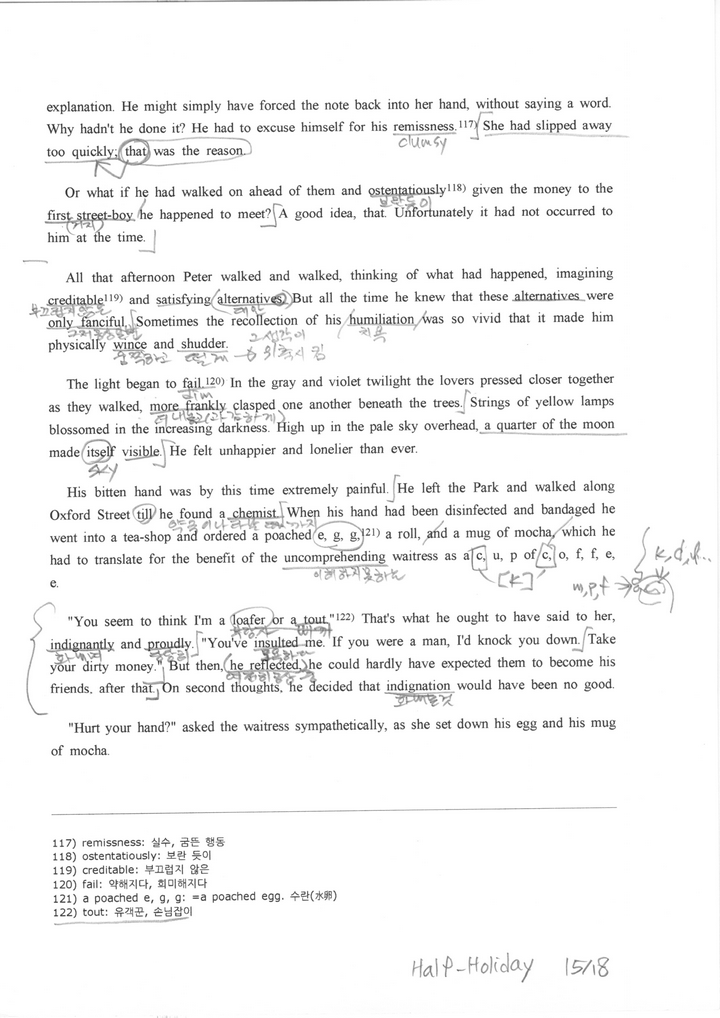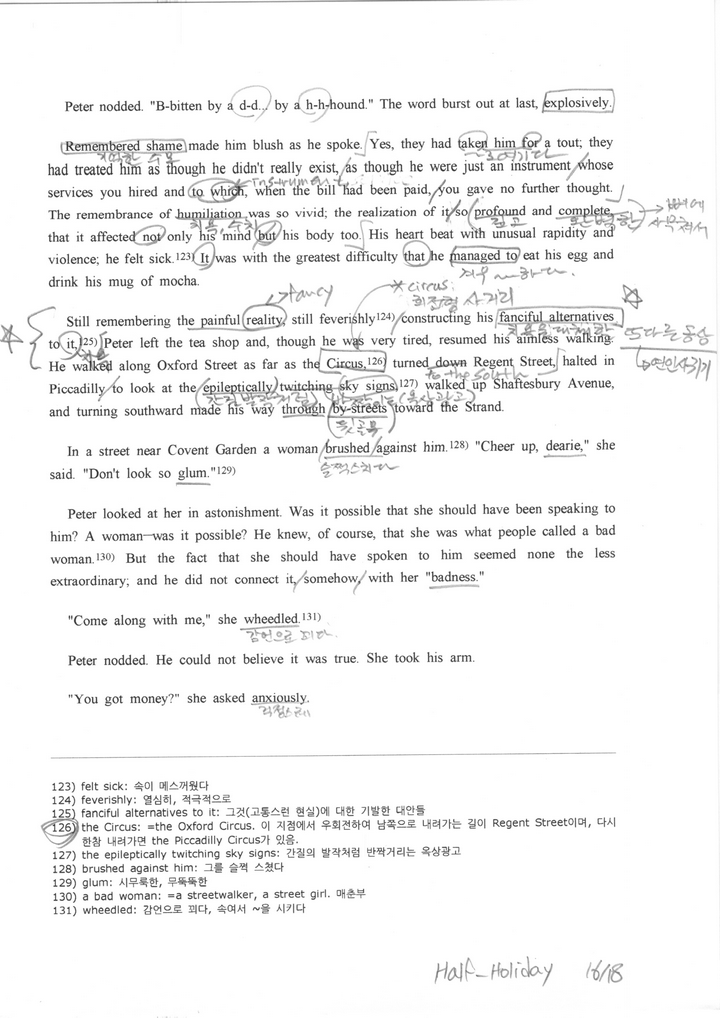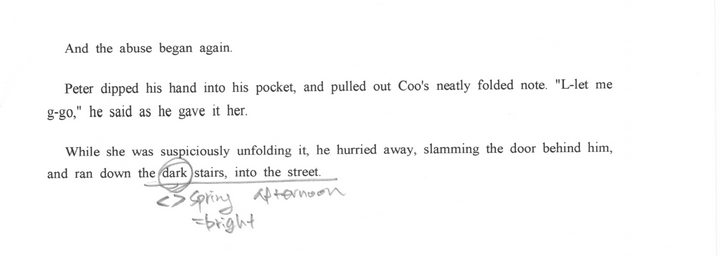Aldous Huxley
[이전]
-------------------------------------------------
-------------------------------------------------
In his imagination he re-acted the scene, not as it had really happened, but as it ought to have happened. When Coo slipped the note into his hand he smiled and courteously returned it, saying: "I'm afraid you've made a mistake. A quite justifiable mistake, I admit. For I look poor, and indeed I am poor. But I am a gentleman, you know. My father was a doctor in Rochdale. My mother was a doctor's daughter. I went to a good school till my people died. They died when I was sixteen, within a few months of one another.
So I had to go to work before I'd finished my schooling. But you see that I can't take your money." And then, becoming more gallant, personal and confidential, he went on: "I separated those beastly dogs because I wanted to do something for you and your friend. Because I thought you so beautiful and wonderful. So that even if I weren't a gentleman, I wouldn't take your money." Coo was deeply touched by this little speech. She shook him by the hand and told him how sorry she was.
And he put her at her ease by assuring her that her mistake had been perfectly comprehensible. And then she asked if he'd care to come along with them and take a cup of tea. And from this point onward Peter's imaginings became vaguer and rosier, till he was dreaming the old familiar dream of the peer's daughter, the grateful widow and the lonely orphan; only there happened to be two goddesses this time, and their faces, instead of being dim creations of fancy, were real and definite.
But he knew, even in the midst of his dreaming, that things hadn't happened like this. He knew that she had gone before he could say anything; and that even if he had run after them and tried to make his speech of explanation, he could never have done it. For example, he would have had to say that his father was a "medico," not a doctor (m being an easier letter than d).
And when it came to telling them that his people had died, he would have had to say that they had 'perished'―which would sound facetious, as though he were trying to make a joke of it. No, no, the truth must be faced. He had taken the money and they had gone away thinking that he was just some sort of a street loafer, who had risked a bite for the sake of a good tip. They hadn't even dreamed of treating him as an equal. As for asking him to tea and making him their friend...
-------------------------------------------------
-------------------------------------------------
But his fancy was still busy. It struck him that it had been quite unnecessary to make any explanation. He might simply have forced the note back into her hand, without saying a word. Why hadn't he done it? He had to excuse himself for his remissness. She had slipped away too quickly; that was the reason.
Or what if he had walked on ahead of them and ostentatiously given the money to the first street-boy he happened to meet? A good idea, that. Unfortunately it had not occurred to him at the time.
All that afternoon Peter walked and walked, thinking of what had happened, imagining creditable and satisfying alternatives. But all the time he knew that these alternatives were only fanciful. Sometimes the recollection of his humiliation was so vivid that it made him physically wince and shudder.
The light began to fail. In the gray and violet twilight the lovers pressed closer together as they walked, more frankly clasped one another beneath the trees. Strings of yellow lamps blossomed in the increasing darkness. High up in the pale sky overhead, a quarter of the moon made itself visible. He felt unhappier and lonelier than ever.
His bitten hand was by this time extremely painful. He left the Park and walked along Oxford Street till he found a chemist. When his hand had been disinfected and bandaged he went into a tea-shop and ordered a poached e, g, g, a roll, and a mug of mocha, which he had to translate for the benefit of the uncomprehending waitress as a c, u, p of c, o, f, f, e, e.
"You seem to think I'm a loafer or a tout." That's what he ought to have said to her, indignantly and proudly. "You've insulted me. If you were a man, I'd knock you down. Take your dirty money." But then, he reflected, he could hardly have expected them to become his friends, after that. On second thoughts, he decided that indignation would have been no good.
"Hurt your hand?" asked the waitress sympathetically, as she set down his egg and his mug of mocha.
-------------------------------------------------
Peter nodded. "B-bitten by a d-d... by a h-h-hound." The word burst out at last, explosively.
Remembered shame made him blush as he spoke. Yes, they had taken him for a tout; they had treated him as though he didn't really exist, as though he were just an instrument whose services you hired and to which, when the bill had been paid, you gave no further thought.
The remembrance of humiliation was so vivid; the realization of it so profound and complete, that it affected not only his mind but his body too. His heart beat with unusual rapidity and violence; he felt sick. It was with the greatest difficulty that he managed to eat his egg and drink his mug of mocha.
Still remembering the painful reality, still feverishly constructing his fanciful alternatives to it, Peter left the tea shop and, though he was very tired, resumed his aimless walking. He walked along Oxford Street as far as the Circus, turned down Regent Street, halted in Piccadilly to look at the epileptically twitching sky signs, walked up Shaftesbury Avenue, and turning southward made his way through by-streets toward the Strand.
In a street near Covent Garden a woman brushed against him. "Cheer up, dearie," she said. "Don't look so glum."
Peter looked at her in astonishment. Was it possible that she should have been speaking to him? A woman‒was it possible? He knew, of course, that she was what people called a bad woman. But the fact that she should have spoken to him seemed none the less extraordinary; and he did not connect it, somehow, with her "badness."
"Come along with me," she wheedled.
Peter nodded. He could not believe it was true. She took his arm.
"You got money?" she asked anxiously.
-------------------------------------------------
He nodded again.
"You look as though you'd been to a funeral," said the woman.
"I'm l-lonely," he explained. He felt ready to weep. He even longed to weep―to weep and to be comforted. His voice trembled as he spoke.
"Lonely? That's funny. A nice-looking boy like you's got no call to be lonely." She laughed significantly and without mirth.
Her bedroom was dimly and pinkly lighted. A smell of cheap scent and unwashed underlinen haunted the air.
"Wait a tick," she said, and disappeared through a door into an inner room.
He sat there, waiting. A minute later she returned, wearing a kimono and bedroom slippers. She sat on his knees, threw her arms round his neck and began to kiss him. "Lovey," she said in her cracked voice, "lovey." Her eyes were hard and cold. Her breath smelt of spirits. Seen at close range she was indescribably horrible.
Peter saw her, it seemed to him, for the first time―saw and completely realized her. He averted his face. Remembering the peer's daughter who had sprained her ankle, the lonely orphan, the widow whose child had tumbled into the Round Pond; remembering Coo and Husky, he untwined her arms, he pushed her away from him, he sprang to his feet.
"S-sorry," he said. "I must g-g... I'd forgotten something. I..." He picked up his hat and moved toward the door.
The woman ran after him and caught him by the arm. "You young devil, you," she screamed. Her abuse was horrible and filthy. "Asking a girl and then trying to sneak away without paying. Oh, no you don't, no you don't. You..."
-------------------------------------------------
And the abuse began again.
Peter dipped his hand into his pocket, and pulled out Coo's neatly folded note. "L-let me g-go," he said as he gave it her.
While she was suspiciously unfolding it, he hurried away, slamming the door behind him, and ran down the dark stairs, into the street.
-------------------------------------------------
- 끝 -





댓글 없음:
댓글 쓰기